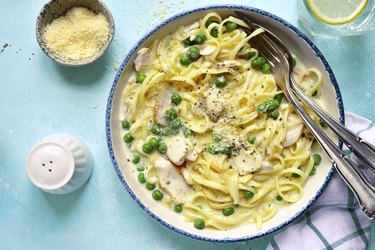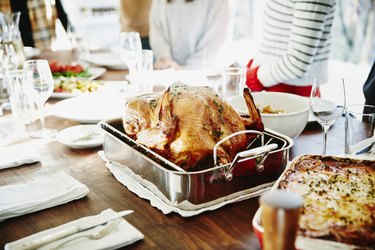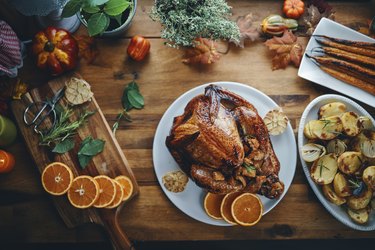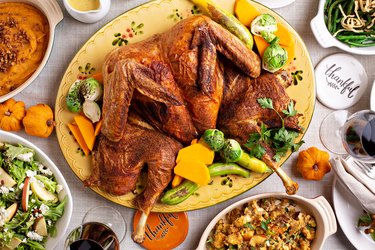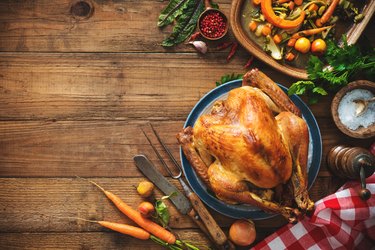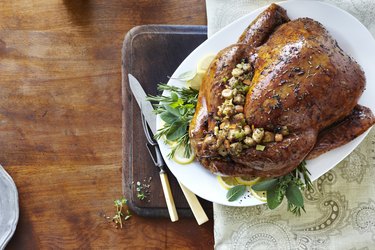
If you want to cook a small turkey, here are some tips that can help, as well as the turkey cooking times and temperatures that you'll need to follow. While there are several ways to cook a turkey, roasting it in the oven is the traditional method and one of the easiest.
Cooking Times and Temperatures for Small Turkeys
Video of the Day
The roasting time can vary depending on the size of the bird you're cooking. When you buy your turkey, the USDA suggests planning for 1 pound of turkey per person. The USDA lists the roasting time for birds of various sizes. These are the cooking times listed for small turkeys:
Video of the Day
- 4 to 8 pounds (breast), unstuffed: One and a half hours to three and a quarter hours
- 12 to 14 pounds, unstuffed: Two and three-quarter hours to three hours
- 6 to 8 pounds (breast), stuffed: Two and a half hours to three and a half hours
- 8 to 12 pounds, stuffed: Three hours to three and a half hours
- 12 to 14 pounds, stuffed: Three and a half hours to four hours
It is safe to cook a turkey from a frozen state; however, the cooking time will be at least 50 percent higher. Pre-stuffed turkeys should not be thawed before cooking, per the USDA.
In terms of temperature, your oven should be set at a minimum of 325 degrees Fahrenheit. Preheating is not necessary. You can choose to roast your turkey at a higher temperature, if you prefer. You'll know the turkey is done when the inside of the stuffing, the thickest part of the breast and the innermost parts of the wings and legs all reach 165 degrees Fahrenheit. After it's cooked, letting it rest for 20 minutes helps the juices settle.
Oven Roasting a Small Turkey
The USDA lists multiple ways to cook a turkey, such as roasting it, grilling it, smoking it, spatchcocking it and deep-frying it. Of these, roasting is the easiest and healthier than deep-frying it.
If you're going the roasted route, there are three ways to cook the turkey; you can roast it as is, stuff it and then roast it, or roast it in an oven bag. The USDA explains how to go about each of the three methods:
- Traditional roasting: Place your turkey in a roasting pan, pop it in the oven and let it cook, following the listed turkey cooking times and temperatures.
- Stuffed roasting: Prepare your stuffing, place it inside the turkey and then roast it, following the listed turkey cooking times and temperatures. This method is slightly more work than roasting it as is and not as safe. For optimal safety, the USDA recommends cooking the stuffing separately. If you are choosing to stuff it before you cook it, it is recommended that you mix the wet and dry ingredients of the stuffing just before you cook it. Stuff the turkey's cavities loosely.
- Oven bag roasting: An oven bag will speed up the cooking time of the turkey and save you some time and effort on clean-up. Follow the instructions listed on the oven bag's packaging, and budget for an extra 30 minutes if the turkey is stuffed.
Remember to remove the turkey's giblets before you roast it. Add a half-cup of water to the roasting pan to keep it from burning at the bottom or getting too dry.
Enjoy your turkey! A study published in the April 2013 issue of the Journal of Human Nutrition and Dietetics notes that poultry is the most widely consumed form of meat in the United States and a significant source of nutrition.
It is high in protein, low in fat and a good source of nutrients like zinc, iron, potassium, phosphorus and B vitamins, according to the University of Illinois. A June 2015 study published in the journal Food & Nutrition Research states that poultry consumption can help with weight management and help prevent diseases like cancer, diabetes and heart disease.
- Food & Nutrition Research: “Role of Poultry Meat in a Balanced Diet Aimed at Maintaining Health and Wellbeing: An Italian Consensus Document”
- USDA: “Let's Talk Turkey — A Consumer Guide to Safely Roasting a Turkey”
- USDA: “How to Cook a Thanksgiving Turkey”
- University of Illinois: “Turkey for the Holidays”
- Journal of Human Nutrition and Dietetics: “Contribution of Meat to Vitamin B-12, Iron and Zinc Intakes in Five Ethnic Groups in the U.S.: Implications for Developing Food-Based Dietary Guidelines”
